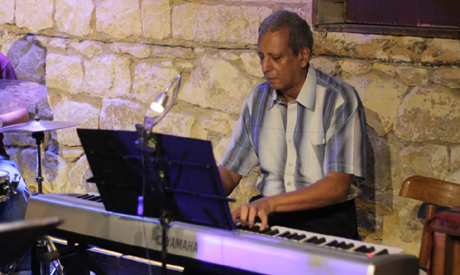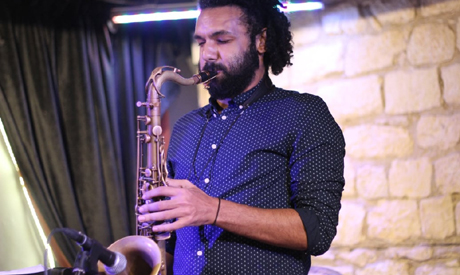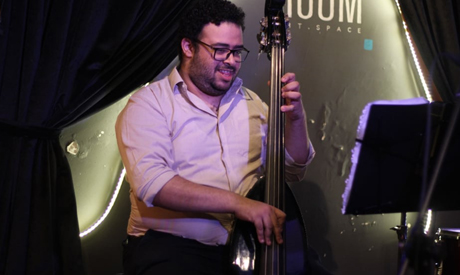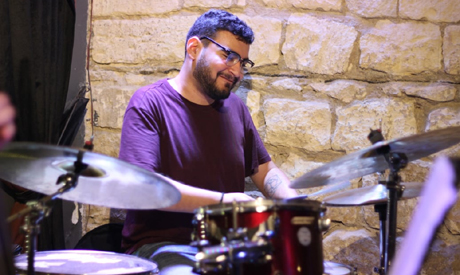It’s not often that names such as Dexter Gordon, Charlie Parker, Dizzy Gillespie, Miles Davis or John Coltrane appear in town. But Cairo music lovers had a chance to experience some of the best works by jazz’s greatest heavyweights at the Room Arts Space & Café in Garden City on Thursday 12 August. And it was thanks to the newly formed JJ Quartet, whose performance of some of the standard jazz repertoire’s best known classics recalls the pure sounds shaping the bebop and post-bop eras. It is probably enough to cite Take the A Train, Ceora, Yardbird Suite, Anthropology, Confirmation, In a Sentimental Mood to give an idea of the evening.
Though a large portion of the evening was taken up by Amr Wagih leading new arrangements of classic numbers with his saxophone, other JJ members too had a chance to work their magic in the cosy space. Wagih’s role in establishing JJ is huge, but leading jazz pianist and educator Rashad Fahim, a Berkley College of Music alumnus, was equally crucial. The two were joined by Karim Adnan Kotb (generally known as Karim Adnan), a principal double bass player at the Cairo Opera Orchestra, and drummer Ahmed Moustafa-Riad. Unlike many other formations, JJ Quartet is informed by an almost purist reserve aiming for an unadulterated jazz experience, with Fahim feeling that any fusion would undermine jazz’s core values.
“JJ stands for Just Jazz,” he says. “We do not perform Arabic jazz or Egyptian jazz, we don’t do that kind of fusion, I don’t favour them; we play jazz as it is.” He mentions an Azerbaijani singer, pianist, and composer, Aziza Mustafa, whose jazz fusions brought her international acclaim. “She is a master of the genre, a musician that covered all the basics of jazz. She understands jazz very well and is free to weave other influences into it,” Fahim comments passionately.
Looking at the current musical explorations of many musicians and bands in Egypt, it is Fahim’s devotion to jazz standards that adds a unique scent to a local music scene fuelled by cross-cultural currents. The JJ Quartet introduces a unique quality and a sound rarely delivered by other formations.

Rashad Fahim (Photo: Ati Metwaly)
It is also worth adding that throughout his rich musical career, Fahim has performed with many musicians who specialise in jazz, attending workshops with jazz icons such as Chick Corea. One of his celebrated bands is the Rashad Fahim Trio, which he established in 2005 with bassist Andrew Safwat and drummer Amir Attalla. Throughout his creative endeavors, his outstanding musicality and skill is marked by a jazz puritanism.
Having happened as a result of encounters between Amr Wagih and Rashad, the new project reflects that mindset. “I’ve been studying music with Mr Fahim for three years now,” Wagih says. “During our sessions, the idea of creating a new band was born. I contacted Karim Adnan and Ahmed Moustafa-Riad, and we began jamming as a quartet at the end of 2020. With time a unified musical language started emerging.”
From Latin jazz and bebop to swing jazz, at the Room Arts Space & Café, the JJ Quartet took us through infinite layers of sonority. Among the repertoire numbers was The Night Has A Thousand Eyes, one of John Coltrane’s hallmarks. Wagih faced the composition’s challenges, allowing the soaring melody to showcase his abilities. No less complex for the saxophonist was Charlie Parker’s Confirmation. Supported by Moustafa-Riad, who handled the rhythmic intricacies with remarkable precision, Wagih’s attack and release notes added his distinctive musical expressions to the composition.
A much softer phrasing came through in Duke Ellington’s In a Sentimental Mood, a composition that invites the audience to close their eyes and enjoy multiple conversations among the musicians, including those masterfully developed by Fahim on piano with Moustafa-Riad on drums. Still within the softer note, Wagih’s saxophone gave Miles Davis’s modal jazz ballad Blue in Green (originally written for trumpet) an interpretive freedom that betokened endless imagination.

Amr Wagih (Photo: Ati Metwaly)
We might go on speaking of the uniqueness of each composition and how it contributed to the memorable evening, but let us conclude with the iconic bebop-style Anthropology, a piece characterised by a cheerful harmonic game that gave each musician the space to present a masterful solo, allowing Adnan to be liberated from his years-long practice within classical music’s confines.
Anthropology, Ceora, Yardbird Suite, Straight No Chaser and many other well-known composition performed allowed the audience to witness the musicians’ remarkable interaction with each other despite differences in musical background and generation, testifying to meticulous preparation.
Wagih, Adnan and Moustafa-Riad represent a younger generation that has learned from Fahim’s experience. “I’m happy to work with young people,” Fahim says. “Each musician in JJ Quartet adds something valuable, something unique. One musician may have a captivating intonation, one excels at precision, another creates a strong bond with the listeners... Those and many other components make the experience worthwhile,” Fahim says, adding that Miles Davis worked with musicians from various generations and educational backgrounds.
The common language the four musicians found together remains one of many proofs that jazz can fuse the many gaps between artists while feeding into their unique personal development. Wagih’s journey with Rashad Fahim has been filled with educational benefits – not many have a chance to live such experience. “Today, I feel much more confident when performing not only jazz but also other genres,” Wagih comments, adding that the jazz standards with their improvisations allowed him a great deal of spontaneity.
Moustafa-Riad has been involved with music since a very young age, but only now has he performed a pure form of jazz. “I was playing with bands in what we call fusions,” he says. “With Mr Fahim, I learned a lot about the new ways of working with harmonies and musical structures. For instance I had never played swing until JJ Quartet. It is also the first time I’ve felt that freedom and I enjoy its conversational character.”

Karim Adnan Kotb (Photo: Ati Metwaly)
The concept of freedom returns in the comments of all musicians. It is also especially interesting coming from Karim Adnan, the only member of the quartet with a strong Western classical music background. “Karim reads sheet music brilliantly,” Fahim notes swiftly and smiles. Yet while the academia and years of classical music performances are definitely valuable for a professional musician whose focus is on technique and personal expression, they can also create limitations to flexibility and improvisation. While the polemic on what is right and what is wrong in music is a heated topic resurfacing between classical and jazz musicians, studies have also shown that even their brains are wired differently.
Wagih notes that during the months of preparation of the JJ Quartet’s repertoire, the most poignant conversations about approaches to sheet music were between Rashad Fahim and Karim Adnan. “While their opinions might have differed at times, they always reached a satisfying creative resolution,” he says.
Meanwhile Adnan feels he benefits a lot from the jazz experience. He reveals, “I probed jazz before but with Mr Fahim it is the first time I’ve delt with this music in such a highly professional manner. In the orchestra we wear tuxedos, in jazz performance we can dress freely. This is the exact feeling I get when playing jazz. I enjoy the sensation of freedom and large segments for improvisation. It is very rewarding.”

Ahmed Moustafa-Riad (Photo: Ati Metwaly)
With their debut concert now behind them, JJ hope to perform more often in the coming weeks and months. Isn’t the Cairo Jazz Festival around the corner, in fact?
The Egyptian music scene is filled with initiatives incorporating jazz, creating fusions. In fact Egypt has many names that have shaped jazz awareness in the country, starting with Salah Ragab (1935-2008), a military commander who introduced the genre to the public with the Cairo Jazz Band and pioneered Egyptian jazz.
Names that marked the scene also include Rashad Fahim, Akram El-Sharkawy, Yehya Khalil (founder of the Cairo Jazz Quartet), Fathy Salama, Eftekasat band, Wave Jazz Band and the recently formed Tarek Raouf Ensemble based on the four-horn jazz combo, among others. While very few of them remain dedicated to jazz standards or incorporate them into their fusion-induced repertoires, others tend to present musical blends that are, to use a broad term, coined as Oriental jazz with all of its subgenres.
In the era of fusions, the return to pure jazz with the JJ Quartet is undeniably a beneficial experience for the musicians performing on stage but also a valuable reminder of this music offered to all listeners.
*A version of this article appears in print in the 26 August, 2021 edition of Al-Ahram Weekly
Short link: